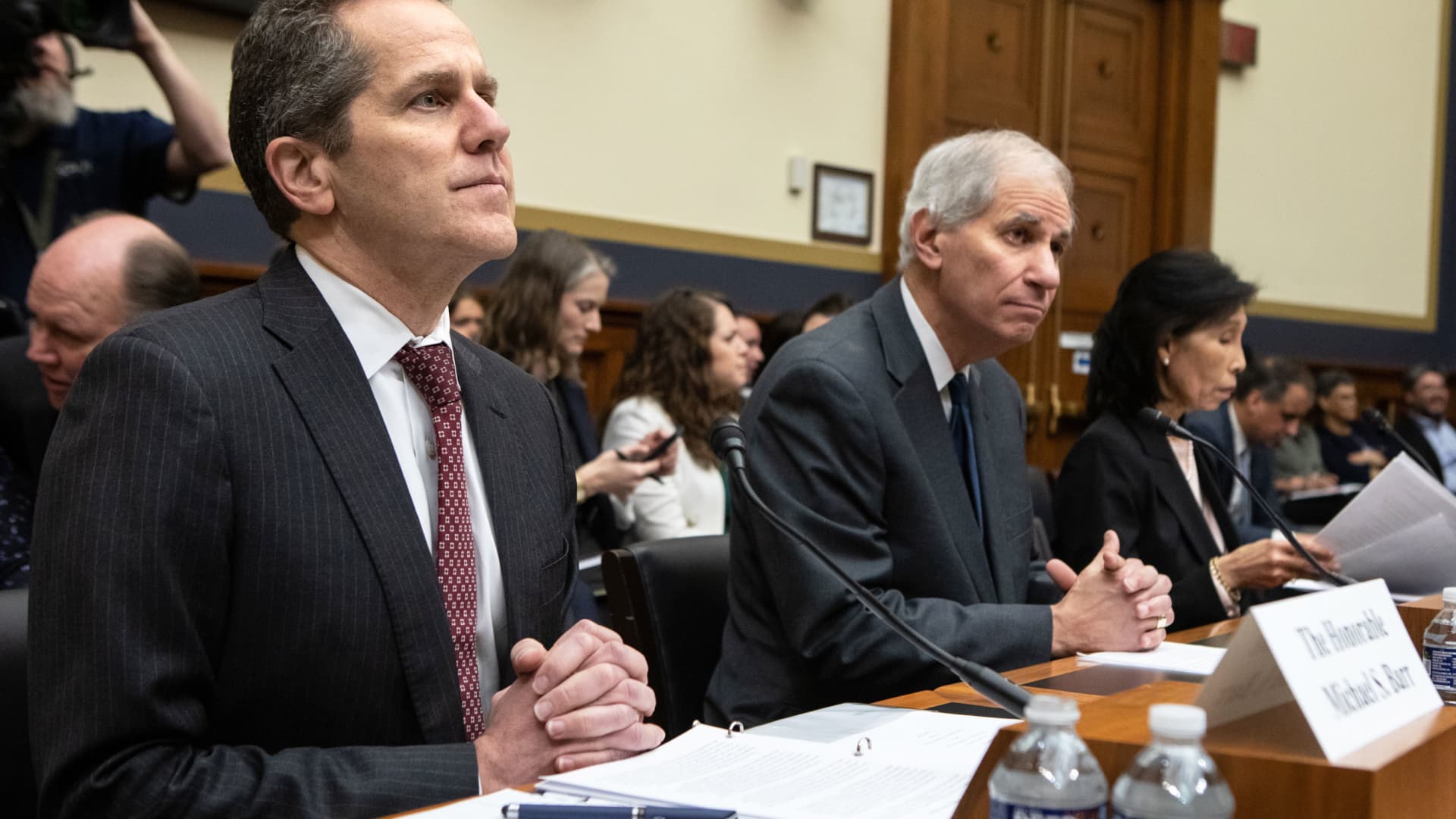House lawmakers tore into top U.S. bank regulators Wednesday, questioning their competency and saying examiners were asleep at the wheel, at a second day of congressional hearings this week about how Silicon Valley Bank and Signature Bank collapsed practically overnight on March 10 and March 12.
“We need competent financial supervisors, but Congress can’t legislate competence,” House Financial Services Chairman Rep. Patrick McHenry, R-N.C., told top officials at the Federal Reserve, Treasury and FDIC at the beginning the hearing.
The committee’s ranking member, Rep. Maxine Waters, D-Calif., questioned whether the repeated warnings regulators delivered to SVB about its balance sheet and long-term interest risks were sufficient.
“The light touch cautions from the Fed to SVB management are clearly not what Congress intended for bank supervision,” said Waters.
Rep. Juan Vargas, D-Calif., put it more bluntly. “It seems like [SVB] blew you guys off, and you didn’t do anything.”
Federal Reserve Vice Chair Michael Barr did not disagree with this assessment. “I expect that we’re going to find that we need to have more of an emphasis on supervisors using the tools they have more promptly, and putting in mitigations in place more promptly when they see problems at banks that they’re supervising,” he said.
McHenry slammed the panel for a lack of transparency over that fateful weekend when the three regulators hastily arranged backup financing to ensure depositors at the two banks wouldn’t lose any money in their collapse.
There are no notes publicly available from regulators’ emergency meetings the weekend the banks collapsed, McHenry said. “That lack of transparency has a negative effect on the public view of the safety of the financial arena,” he added.
The question of what records would be given to Congress came up repeatedly in the contentious hearing.
Rep. Brad Sherman, D-Calif., requested a broad survey of banks that are undercapitalized the same way SVB was.
“Are there any banks out there, and roughly how many, that have capital of under 5% if you subtract from their stated capital their unhedged, unrealized losses on long-term debt?” Sherman asked the regulators.
“Let us get back to you on that,” said Martin Gruenberg, chairman of the Federal Deposit Insurance Corp. “We’ll get the numbers and share them with you very quickly.”
Republican Rep. Bill Huizenga of Michigan, demanded raw, confidential supervisory information about the banks, available to regulators ahead of the collapses.
Gruenberg did not agree explicitly to provide confidential information, instead suggesting the committee would need to issue a subpoena for this information. “I think you have the authority to compel that information,” he said, “and [the FDIC] will be responsive to you.”
Members of the Republican majority House challenged many of the decisions made by regulators in the hours and days after SVB collapsed and Signature Bank followed 48 hours later. Chief among these was what regulators did, or didn’t do, in the three days from the time they each learned of SVB’s looming collapse, on Thursday to Sunday, when they decided that the failures of SVB and Signature Bank posed a systemic risk to the financial system.
“Despite U.S. regulators having clear knowledge of insufficient risk management, it seems the examiners and your supervisors were asleep at the wheel while signs that Silicon Valley Bank was heading towards a collapse were staring them right in the face for many, many months,” Rep. Ann Wagner, R-Mo., said to Barr.
On Tuesday, bank stocks turned negative following a similar hearing before the Senate Banking Committee. Investors may have been spooked by the three top regulators each saying they favored more stringent rules for banks with more than $100 billion in assets.
Nellie Liang, undersecretary for domestic finance at the Treasury Department, testified alongside Gruenberg and Barr before the House committee after appearing Tuesday before the Senate Banking Committee.
Sens. Elizabeth Warren, D-Mass., and Catherine Cortez Masto, D-Nev., both members of Senate Banking, introduced bipartisan legislation on Wednesday that would require federal regulators to claw back all or part of compensation earned by bank executives in the five-year period preceding a banking failure.
“Americans are sick and tired of fat cat bankers paying themselves handsomely while risking other people’s hard-earned money,” Warren said in a statement. “It’s time for Congress to step up and strengthen the law so bank executives bear the cost of failure, not line their pockets and walk away scot-free.”
Sens. Josh Hawley, R-Mo., and Mike Braun, R-Ind., also sponsored the bill.
Read more of CNBC’s politics coverage:





